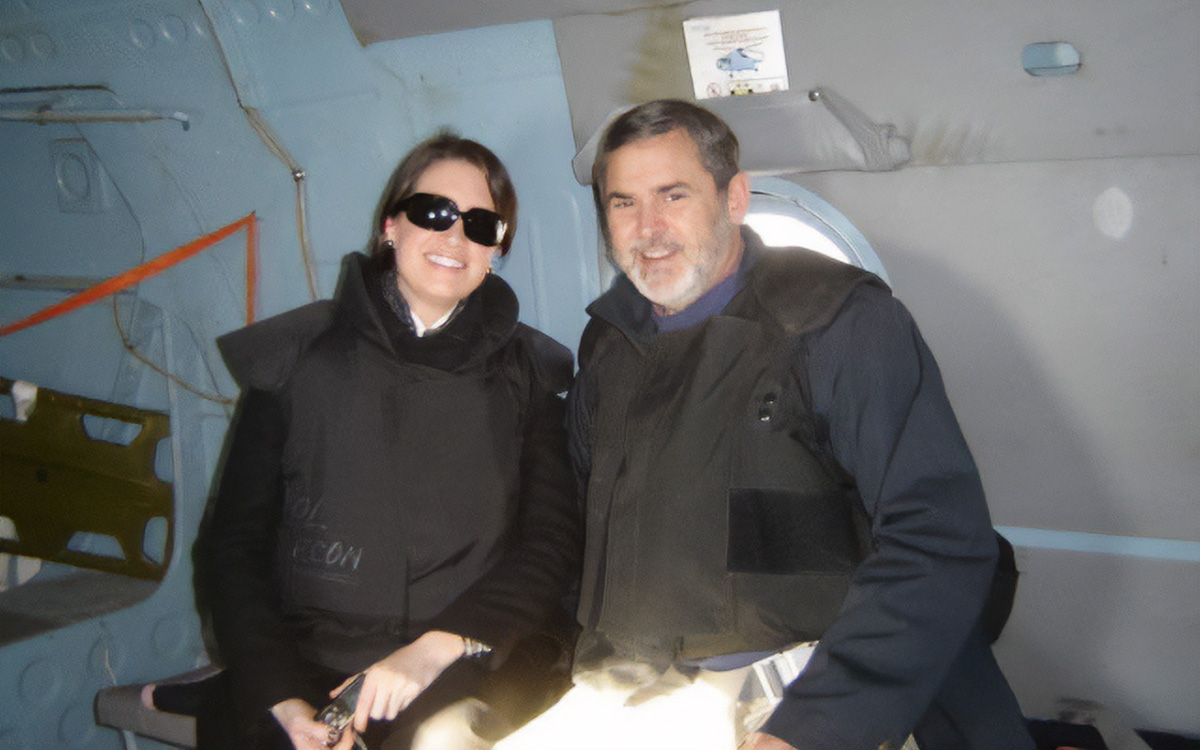Richard Boucher, 1951-2025: “The Boucher Rules” Live On
BY CAITLIN HAYDEN

Richard Boucher and Caitlin Hayden traveling in a USAID helicopter during a visit to the Panjshir Valley of Afghanistan in 2007.
Courtesy of Caitlin Hayden
Richard Boucher’s Words of Wisdom
- If you don’t want to see it in print, don’t say it.
- Good guidance can explain the issue to your mother.
- Talk about results. If you don’t have results, talk policy. If you don’t have policy, talk facts. If you don’t have facts, talk process. You always have process.
- “Le enigma sono tre, la morte una.” —Puccini, “Turandot.” Loosely translated: They get three questions; you screw one up, you’re dead.
- Know the difference between what you think you know and what you know you know. Talk only about what you know you know.
- If it is good news, the White House gets it.
- Everyone who writes for the spokesman should spend an hour at the podium, or at least five minutes in front of a mirror.
- It’s better to be right than fast. You can’t be both.
- If you don’t have news, offer good food or a good place to visit.
- Quote Matt Bahr, placekicker for the Giants: “Rather than withhold information, I’d prefer not to say anything.”
- You can say anything you want but some things only once.
For nearly 20 years, a document has floated around the State Department that serves as a bit of a bible for aspiring spokespeople. The one-pager, written in green Times New Roman font (because its author always wrote in green ink), was titled “Richard Boucher’s Words of Wisdom.” It included 11 top tips from the department’s longest-serving Assistant Secretary for Public Affairs, who briefed from behind the podium for seven Secretaries: Baker, Eagleburger, Christopher, Albright, Powell, Rice, and Clinton. Richard’s voice was intertwined with U.S. foreign policy for decades until his retirement in 2009 with the rank of Career Ambassador, so it’s fair to say his thoughts on the topic were authoritative.
I was privileged to be Richard’s senior staffer for six years, first in the Bureau of Public Affairs and then in the Bureau of South and Central Asian Affairs. These were dream jobs, truly. Criss-crossing the globe—in airplanes, helicopters, and up-armored SUVs—I spent endless hours with an experienced diplomat who was funny, humble, whip-smart, and consistently kind. He was one of those rare people who managed to be unfailingly human no matter how senior he got, from the regular spilling of food on his tie to his love of the underpants gnomes from “South Park.”
In all the years we worked together, I had more requests for copies of his “Words of Wisdom” document than I can count. It was also often referred to as “The Boucher Rules.” And I think that’s because the rules document is more than a technocratic manual for being a government spokesperson. It is really a guide everyone can follow to manage crisis and be a good human.
On June 27, Richard passed away at the age of 73 from an aggressive form of cancer. Like many of us who were close to him, I’m devastated knowing Richard’s not around to talk to anymore.
In his last days, he was with his loving family—Carolyn, Maddie, and Peter—who shared messages Richard’s friends had been sending by email as we learned how sick he was. These messages painted the picture of someone who left a meaningful mark on others in every part of his life and encouraged countless young people to consider service. Since his death, it’s been gratifying reading the tributes online from around the world: from friends, family, neighbors, students he taught, and people he met in his travels. And from a lot of folks who never met him but were handed down a copy of the “Words of Wisdom.”
Richard’s rules were written before TikTok or X, but I think they’re more relevant than ever. I’d encourage every communications professional and diplomat out there to save this document for responding to a crisis. But, more than that, I think we can all take something from it about how to live our lives with humility and empathy.
In today’s world, it can often feel like no one is listening, eager to score points on our political opponent rather than do the work of trying to solve problems together. The public square tends to value and reward volume more than substance. But rather than fall prey to the easy trap of posting first and thinking later, Richard’s rules urge us to take a breath and think carefully about what we say, knowing our words don’t go away. You can’t take back a lie or something said in anger.
If responding fast means you can’t be accurate or reasonable, slow down. His rules encourage us to talk in ways that help people understand, not beat others down with our expertise. His rules say that we need to be careful not to talk authoritatively about things we really don’t know. And that we need to put ourselves in the shoes of others, not just when we’re writing talking points for them.
One of Richard’s rules is to “know the difference between what you think you know and what you know you know; and talk only about what you know you know.” He’s not here to confirm or deny this, but I know he’d be absolutely thrilled to discover how far and wide “The Boucher Rules” are still traveling all these years later, continuing to inform the dedicated public servants following in his footsteps.
When sharing or linking to FSJ articles online, which we welcome and encourage, please be sure to cite the magazine (The Foreign Service Journal) and the month and year of publication. Please check the permissions page for further details.

